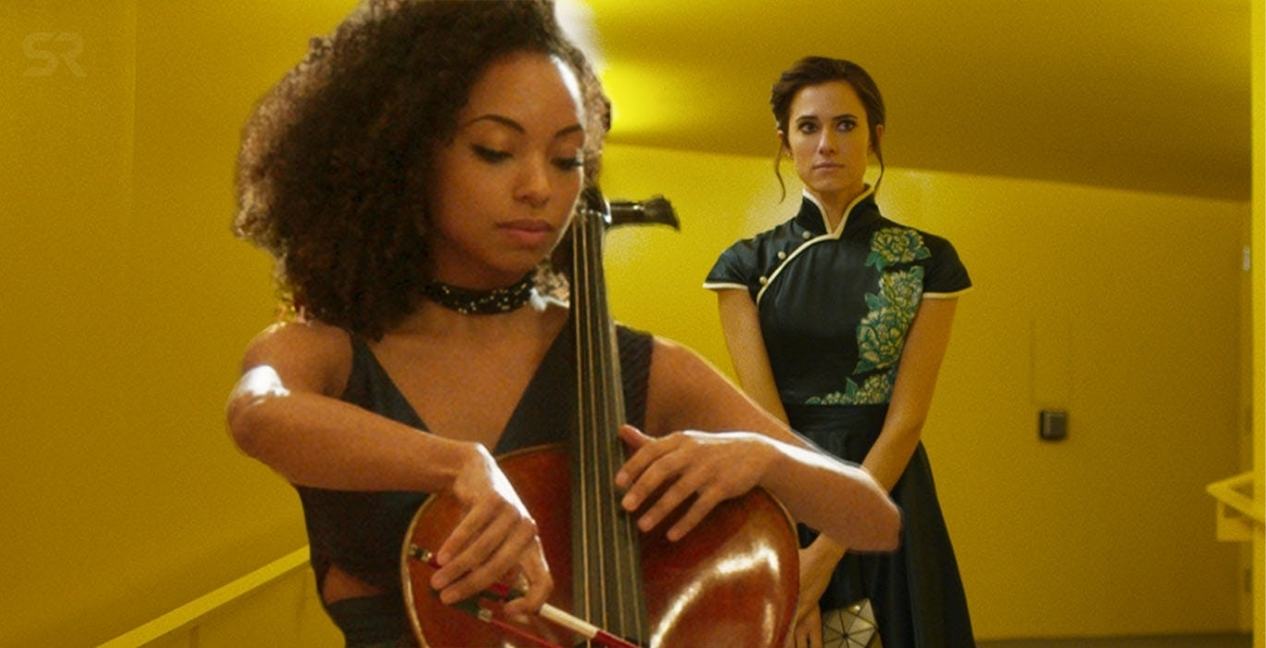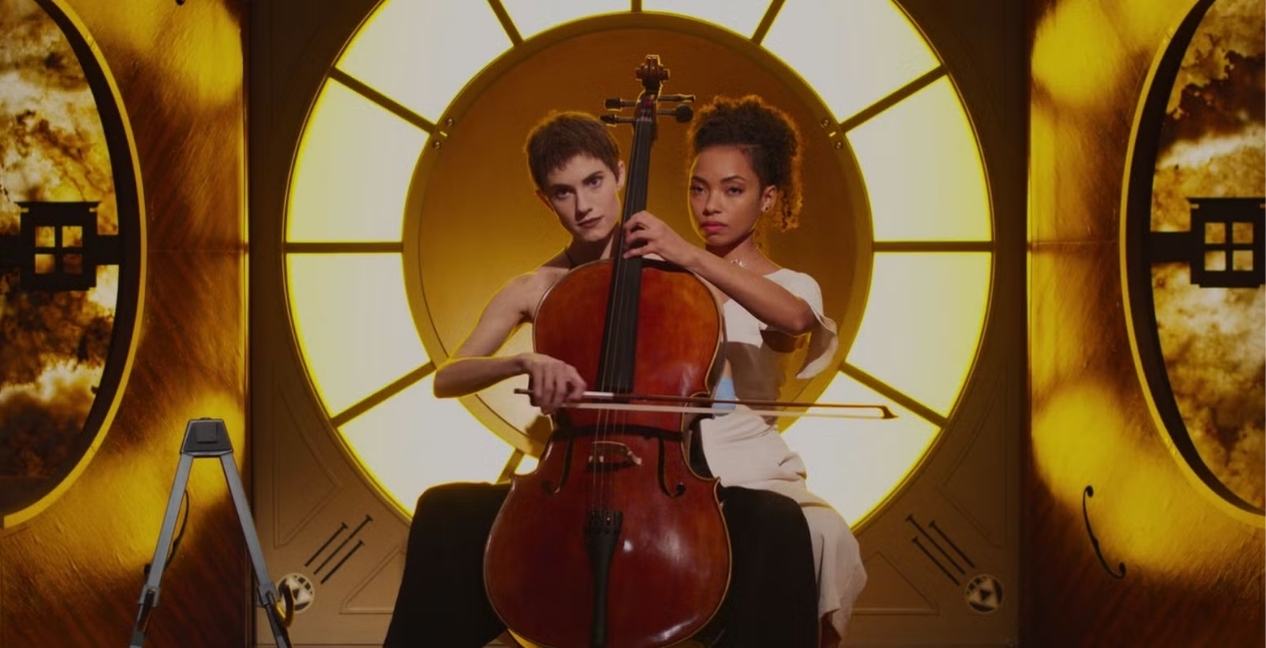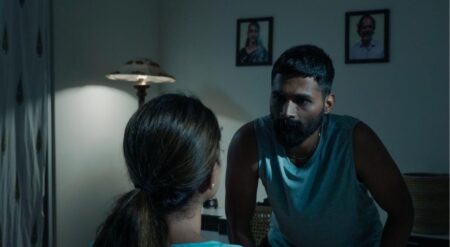The Perfection, directed by Richard Shepard, is Netflix’s newest original film and defining it by a genre is difficult. As a film, it circles body horror, revenge thriller, obsession thriller, infection horror, and getting into the nuances in each of those representations give away much of the film. In the simplest of terms, The Perfection focuses on two women, Charlotte (Allison Williams) and Lizzie (Logan Browning), who are musical geniuses. The two women are at different stages in their musical careers, with the film showing what happens when their paths converge.
Charlotte is finished with music. After walking away to be her mother’s caregiver her career is done. That is, until she calls up her old instructors, Anton (Steven Weber) and Paloma (Alaina Huffman), meeting them in Shanghai and offering to judge a competition where the winner enters their boarding school.
Lizzie is a rising star, a perfect performer, and ultimately the new Charlotte. A student of the same cello boarding house run by Anton, she has what Charlotte once did. Admiration, fame, performances, and she even has the same music note tattooed on her back.
When the two meet, a mutual admiration fuels a duet of sex, emotion, music, and adventure, with Charlotte choosing to accompany Lizzie on her two-week adventure exploring China. After boarding a bus to their next destination, Lizzie’s hangover is getting worse, and the horror begins.
The Perfection plays with time perfectly, and its characters even better.

The Perfection solidly moves through four movements, like a symphony, with each defined by title cards throughout the film. These movements shift the narrative, shaking the ground beneath the audience by changing the position of victim, villain, and hero as a different character takes the focus. The ability to manage the same characters embodying varying aspects that often work again each other, like villain and victim, is not an easy feat but one that Shepard executes well.
By rewinding scenes and switching perspectives, the one-and-a-half-hour film details its story in a way that I haven’t seen a horror film do before. The Perfection adjusts the audience’s viewpoint into the women’s lives and situations at precisely the right moments, revealing the abuses they enact against each other, until finally the true villain is revealed. This uncertainty about who the characters are builds tension, as both women are clearly unstable—unpacking their reasoning and adding a meaningful exposition and in no way repetitive.
To go deeper into the film and its resolution, even at a high level, means to give away crucial parts of its plot. With that being said, the strength of The Perfection lies in some of the most well-executed twists this year, meaning that you should head spoiler warnings for this film in order to experience it in a complete way.
Having drugged and convinced Lizzie cut off her hand, Charlotte seems to have completed her mission, ruining the young cellist, and appears to fade away from the plot. That is until Lizzie’s trauma and injury leave her determined to seek revenge and ostracized by her mentor Anton and the music world. Fulfilling her revenge, she beats and kidnaps Charlotte, delivering her to Anton as an offering to get back in the house.

It’s here where we learn that the villain is, in fact, neither of the two women. Instead, it is perfection. Both women have been raped and brainwashed into perfection by their teachers. Victims of a cycle of abuse by Anton and his teachers, which they themselves also went through.
It is here that the title of the film comes into a new light, The Perfection is in about The Perfection, the piece played by the young cellists to amuse Anton and the other teachers, which, if played imperfectly, results in abuse.
The ground shakes again, leaving the woman who caused the other to cut off her hand and ruin her career situated as a woman trying to be a hero. Anton is the abuser, the villain, and although Charlotte act to shock Lizzie out of Anton’s grasp, it doesn’t work. Lizzie is still seeking revenge, and that is through Anton, ignoring the trauma of her sustained abuse, using music and the ability to play as a holy act, and worth the abuse. Instead, she is here to enact revenge, until she isn’t.
The disorienting nature of the narrative can be frustrating, but it also works to keep the audience engaged in a story that showcases the complexities of trauma and the splinters it causes in people’s mental wellness. The Perfection positions expectations to be the best at the center of the narrative. Be the best because it is expected of you, a thread of reality in a plot that is first propelled by hallucinations and body horror.
When it looks like Lizzie is about to enact her revenge on Charlotte, the ground shakes again, with the two teachers and abusers Theiss (Mark Kandborg) and Geoffrey (Graeme Duffy) falling down dead, revealing that the two have worked together to enact a duet of revenge against the cult of perfection that delivers the climax of the film. The way that The Perfection shifts direction repeatedly never gets stale or frustrating, instead it pulls you in and the strings-driven score escalates the tension. In truth, the film succeeds because if you don’t know who to root for, you can never sit at ease.
Everything about our leading duo is charming in this Netflix Original body horror film.

The Perfection is uncomfortable, gratuitous, and there are scenes that will make you shift in your seat as the narrative plays with you. For some, the lack of ease may be too much, with no room to come up for air. But it’s not just the fast pace of the film that causes this, but also scenes intercut with others. When Charlotte and Lizzie have sex, the passion and intimacy are intercut with the intimacy of a duet, the dual cellos scoring the explicit scene, making your heart race as you see them connect. While Shepard utilizes this in a moment of bliss, he also uses it in moments of fear.
Both Charlotte and Lizzie have moments contemplating their respective traumas. The footage of them sitting and thinking is laced with the jarring moments of their trauma. For Lizzie, bugs and blood, for Charlotte, suicide and electroshock. This method of delivering a look inside of our main characters’ minds is appreciated, if not slightly overused, in scenes that don’t bear the same weight.
In addition to direction, the actresses behind Charlotte and Lizzie are superb. Williams and Browning bring emotion and depth, showcasing an acting range that is necessary for the variety of archetypes their characters embody. Charlotte is just, or at least she believes she is just. The way that Williams delivers her lines in a way that is matter-of-fact is chilling in some instances and emotional in others. She is working on her own logic, one that is informed by her need to save Lizzie from the abuse that comes with being the best.
Lizzie is compelling. From the beginning when she flirting with Charlotte, to the middle when she is in tears, rage-filled, and out for revenge. As well as at the end, where she takes on the role of an abuser and then a hero. Browning brings everything she has to this character, and it shows. She is the best actor on the screen and a character who vacillates between empathetic and evil as the film progresses. Ultimately, Browning’s portrayal of the hero and the way the two execute revenge, playing together one last time, is a still that has a power that I’m unsure will be matched in a genre film during the rest of the year.

Overall, The Perfection is a solid film, and for Netflix, it is completely unexpected. The scope of the narrative and the depth of the body horror is a first for the platform and serves as a testament to the quality of streamable films as Netflix continues to partner with other studios, in this case, Miramax. While the film itself is close to perfection, it is not going to be for everyone.
For dark genre fans, it will be a hit, but for those who stumble into The Perfection not expecting shock and awe, it may be too much. While a lot of the violence takes place off-screen, the images your mind fills in push the tension farther, and the reveal of a cycle of sexual abuse is heavy material, while it is handled well in the end, it is off-putting at first.
While I recommend the film to fans of Korean Revenge films like Park Chan-wook’s Vengeance trilogy or The Handmaiden, I do not recommend this for viewers unfamiliar or uncomfortable with dark subject matter and extensive use of body horror, which includes scenes of vomiting, dismemberment, among other things. In addition, if you are triggered by the depiction of trauma or subject matter dealing with rape or sexual assault, although none is shown, you should still approach with caution.
The Perfection is beautifully shot, with stills that are fit to hang on a wall while also having images that aim to make your stomach churn. If you’re looking for a weekend fright, press play, but if you’re looking for relaxation, you may want to avoid this uncomfortable film that straddles the line between horror and thriller and exploits shocking elements from both.
The Perfection is streaming exclusively on Netflix.
The Perfection
-
Rating - 8/108/10
TL;DR
The Perfection is beautifully shot, with stills that are fit to hang on a wall while also having images that aim to make your stomach churn. If you’re looking for a weekend fright, press play, but if you’re looking for relaxation, you may want to avoid this uncomfortable film that straddles the line between horror and thriller and exploits shocking elements from both.







